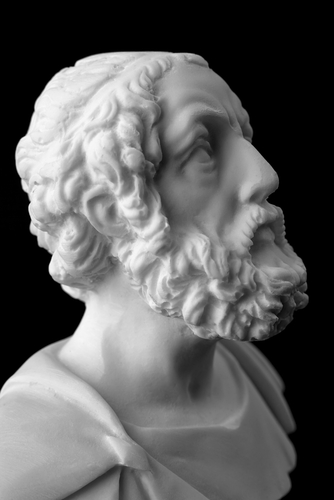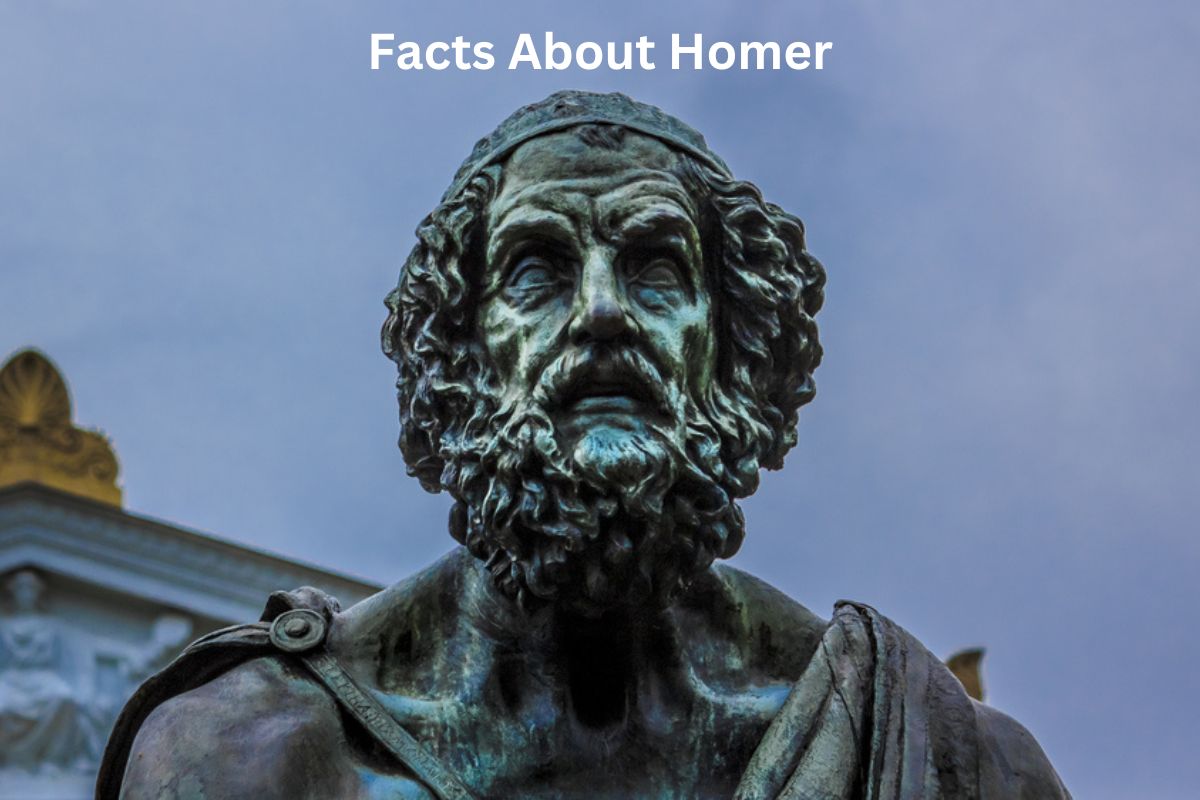Homer is a legendary ancient Greek poet traditionally attributed as the author of the Iliad and the Odyssey, two epic poems that have left an indelible mark on Western literature.
While the exact identity and existence of Homer are debated among scholars, his works have had a profound influence on subsequent writers and artists.
Composed in Ancient Greek, Homer’s epics were initially part of the oral tradition, eventually recorded in writing, and explore themes such as heroism, the gods’ role in human affairs, fate, hospitality, and the complexities of human relationships.
The enduring legacy of Homer’s works lies in their ability to provide insights into ancient Greek culture, history, and the timeless aspects of the human condition.
Homer Facts
1. Legendary ancient Greek poet
Homer is widely regarded as one of the greatest poets of ancient Greece. His name has become synonymous with epic poetry and storytelling.
Also Read: Facts About the Greek Gods
His works have left an indelible mark on Western literature and continue to be studied and celebrated today.

2. Traditionally attributed as the author of the Iliad and the Odyssey
The two major works attributed to Homer are the Iliad and the Odyssey. The Iliad focuses on the Trojan War, specifically the events surrounding the Greek hero Achilles. The Odyssey tells the story of Odysseus’ journey home after the war.
Also Read: The Odyssey Facts
These epics are considered foundational texts in Western literature, exploring themes of heroism, fate, and the complexities of human nature.
3. Works were originally part of the oral tradition
Homer’s epics were initially passed down through generations via oral poetry. It is believed that he composed his poems during the 8th century BCE.
The oral tradition involved bards or poets reciting and performing the stories in public gatherings, often accompanied by musical instruments.
This oral transmission allowed for variations and adaptations in the retelling of the stories, contributing to the rich and diverse interpretations of Homer’s works. The eventual recording of these epics in written form preserved them for posterity.
4. Exact identity and existence of Homer are debated among scholars
While Homer is traditionally considered a single poet who authored the Iliad and the Odyssey, there is ongoing scholarly debate about his true identity and existence.
Some argue that Homer may have been a collective name for a group of poets or storytellers who contributed to the composition and transmission of these epics.
Others propose that Homer was an individual poet who composed the works attributed to him. The lack of concrete historical evidence adds to the mystery surrounding Homer’s identity.
5. The Iliad depicts the Trojan War; the Odyssey follows Odysseus’ journey home
The Iliad is primarily centered around the events of the Trojan War, focusing on the wrath of Achilles and the conflicts between the Greeks and the Trojans.
The Odyssey, on the other hand, narrates the arduous journey of Odysseus as he faces various challenges and encounters mythical creatures and gods on his way back to his homeland of Ithaca. These epics present vivid portrayals of heroes, gods, and the complexities of human nature.
6. Written in Ancient Greek
Homer’s works were composed in Ancient Greek, specifically in a poetic meter known as dactylic hexameter.
This meter consists of six metrical feet per line, each foot consisting of either a long syllable followed by two short syllables or a stressed syllable followed by two unstressed syllables.
The language and style employed by Homer have had a lasting influence on Greek literature and have provided valuable linguistic and literary insights into the ancient Greek world.
7. Homer’s epics have had a significant influence on Western literature
The impact of Homer’s works on Western literature cannot be overstated. His epics provided a foundation for subsequent Greek writers and poets, such as Hesiod and Euripides, and influenced countless writers and artists throughout history.
The themes, characters, and narrative structures found in the Iliad and the Odyssey have been incorporated and reimagined in various literary works, including Virgil’s Aeneid, Dante’s Divine Comedy, and James Joyce’s Ulysses, to name just a few.
8. Characters like Achilles and Odysseus embody the heroic ideal
Homer’s characters have become archetypes of the heroic ideal in Western literature. Achilles, the Greek warrior in the Iliad, represents the epitome of physical strength, courage, and the pursuit of glory.
Odysseus, the protagonist of the Odyssey, embodies cunning intelligence, resilience, and the struggle to return home. These characters showcase a range of virtues and flaws, making them complex and relatable to audiences throughout the ages.
9. Themes include heroism, the gods’ role, fate, hospitality, and human relationships
Homer’s works explore a wide range of themes that continue to resonate with readers. The concept of heroism, the interplay between mortals and gods, the influence of fate on human lives, the significance of hospitality and its consequences, and the complexities of human relationships are all prominent themes.
These themes invite readers to reflect on universal aspects of the human condition, raising profound questions about identity, morality, and the nature of existence.
10. Provides insights into ancient Greek culture and history
Homer’s poems serve as valuable historical and cultural artifacts, shedding light on various aspects of ancient Greek society. They offer glimpses into religious beliefs and rituals, military customs and warfare, social structures and hierarchies, gender roles, and the values held by the ancient Greeks.
By studying Homer’s works, scholars and readers gain a deeper understanding of the cultural, political, and intellectual context of ancient Greece, providing important insights into the foundations of Western civilization.
